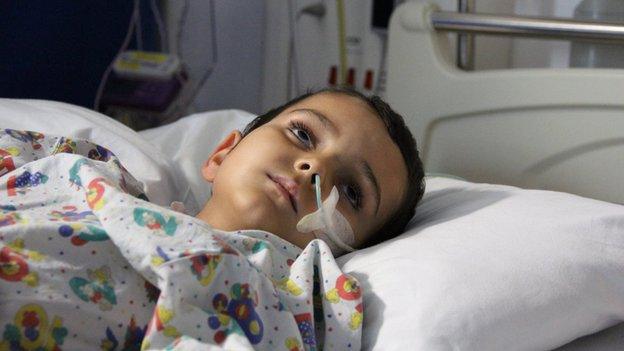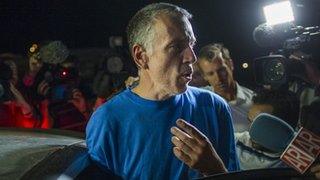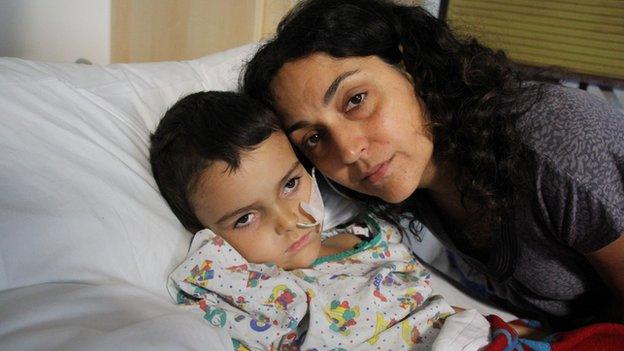Ashya King: Did politicians jump on bandwagon?
- Published
- comments
Say the name Ashya King to most doctors and a pained expression comes over their face.
Talk to politicians about the issues surrounding the case and you get a similar reaction.
Of course, there is sympathy for the family who took their five-year-old out of hospital in the middle of treatment for a brain tumour.

Ashya was being treated for brain cancer at Southampton General Hospital
Every parent knows the strong instinct to protect a child in whatever way you can.
But the decisions taken in the face of the heat of the maelstrom that engulfed Ashya have left some big questions hanging in the air, one of the most significant centres on political interference in granting the family NHS treatment abroad.
BBC South's Health Correspondent David Fenton revealed that three leading cancer experts have written to the head of NHS England making clear their disagreement with the decision.

Ashya's father Brett King has criticised the way his son's case was dealt with by doctors in Southampton
The three signatories accused the NHS of "jeopardising" Ashya's chance of a cure and they said it could have "irredeemable consequences" for other children and their families.
And I understand that one of the doctors' deepest concerns was the way that politicians had tried to influence what should have been medical decisions.
On a local level, Portsmouth City Council is now holding an inquiry into the way ward of court applications were made.
And nationally, questions are now being raised about pressure via Health Secretary Jeremy Hunt.
Deputy PM's view
I spoke to the Deputy Prime Minister Nick Clegg about those questions during a visit to Hampshire.
He was one of those who added their voice to the debate about Ashya at the height of the media interest.
While Ashya was separated from his parents in Spain, the deputy PM questioned the actions of Southampton General Hospital.
"I think it has been a very unfortunate sequence of events and there have clearly been misunderstandings along the way."
The government offered to fly an expert to Spain to give advice, but it never happened. The King family relied on the opinions of the private clinic in Prague that was providing the proton beam therapy.
And it has since emerged that Ashya never had the chemotherapy that a British court had previously required, after hearing British expert opinion.
So did politicians rush to judgement?
With the strength of public opinion did they exert undue pressure?
Mr Clegg was one of the first to call for a re-think. His family connections with Spain give him a personal insight into the issues of funding treatment in Europe and speaking to me in Hampshire this week he backed the decision over Ashya.
"The NHS is funding the treatment on the basis of clinical advice and clinical expertise, and that is absolutely essential.
"You need to get the balance between the wishes of the patient, and the family in this case, with the clinical experts and that is what has underpinned the case to fund his care in Europe."
But I asked him, with hindsight, should politicians really have jumped on to that wave of public opinion?

Ashya's disappearance from Southampton General Hospital led to searches in France and Spain
Mr Clegg showed the same awareness of public opinion that has so frustrated the cancer experts.
"I desperately wish him a speedy recovery and in the NHS with anyone we need to get the balance right. We need to listen to patients, listen to their families, but also give the best clinical advice possible.
"That is why I understand NHS England has funded his care even though it has taken place outside this country."
For many in the medical world this sort of answer is unacceptable.
They have to deal with the heartache of cancer decisions every day. Now parents of sick children are using Ashya's case as a precedent for their own questioning of hard medical and financial realities.
There are several inquiries, internal and external, looking into the issues around Ashya.
Yes, the health of a young boy is paramount, and that crazy chase across Europe and the huge media attention may well have jeopardised his progress.
Everyone wishes Ashya and his family well. But as the emotion subsides politicians may realise that they have some important lessons to learn too.